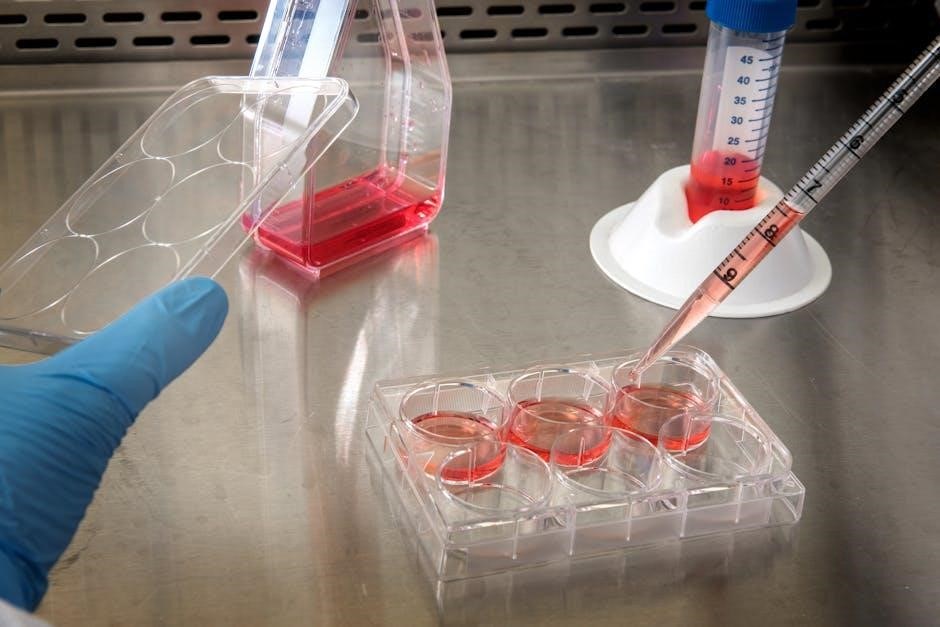ap biology unit 1 test multiple choice pdf
Summary
Download your free AP Biology Unit 1 test PDF! Practice with authentic questions and assess your readiness. Get instant access now!

AP Biology Unit 1 introduces foundational concepts like scientific inquiry, biological systems, and essential processes. Mastering multiple-choice questions is critical for exam success, as they test conceptual understanding and analytical skills.
1.1 Overview of AP Biology Unit 1
AP Biology Unit 1 covers foundational concepts such as scientific inquiry, the nature of science, and biological systems. It introduces students to essential processes and principles that form the basis of advanced biology studies. The unit emphasizes critical thinking and the application of scientific methods to real-world problems. Multiple-choice questions (MCQs) play a significant role in assessing understanding, as they evaluate the ability to analyze and interpret biological data effectively. Practicing MCQs helps students identify knowledge gaps and refine their test-taking strategies, ensuring better preparation for the AP Biology exam.
1.2 Importance of Multiple-Choice Questions in AP Biology
Multiple-choice questions (MCQs) are a cornerstone of the AP Biology exam, assessing critical thinking, analysis, and application of knowledge. They demand precise understanding and the ability to distinguish between correct and incorrect answers. MCQs simulate real exam conditions, helping students gauge their preparedness. Regular practice with MCQs sharpens problem-solving skills and time management, essential for success. Solving diverse MCQs also highlights knowledge gaps, allowing targeted review. This structured approach ensures comprehensive preparation and boosts confidence for the actual test.
1.3 How to Prepare for the AP Biology Unit 1 Test
Effective preparation for the AP Biology Unit 1 test involves understanding the exam format and focusing on multiple-choice strategies. Utilize practice PDFs to familiarize yourself with question types and improve time management. Active learning techniques, such as creating concept maps and flashcards, enhance retention. Regularly review and analyze weak areas to strengthen your foundation. Simulate test conditions during practice to build stamina and reduce anxiety. Consistent practice and targeted review ensure a comprehensive understanding of Unit 1 topics, boosting confidence and readiness for the actual test.

Key Concepts in AP Biology Unit 1
Unit 1 emphasizes scientific inquiry, the scientific method, and biological systems. It explores foundational concepts like cells, molecules, and biological processes, essential for tackling multiple-choice questions effectively.
2.1 Scientific Inquiry and the Nature of Science
Scientific inquiry forms the foundation of AP Biology, emphasizing the development of critical thinking and problem-solving skills. It involves the systematic exploration of biological phenomena through observation, experimentation, and data analysis. Understanding the nature of science, including the differences between theories, laws, and hypotheses, is crucial for interpreting scientific evidence. Multiple-choice questions often test students’ ability to apply these concepts to real-world scenarios, making it essential to grasp the scientific method and its relevance to biological systems. Practical examples and case studies help students connect abstract ideas to tangible outcomes.
2.2 The Scientific Method in AP Biology
The scientific method is a structured process used to explore biological questions and phenomena. It involves making observations, forming hypotheses, conducting experiments, analyzing data, and drawing conclusions. In AP Biology, understanding the scientific method is essential for interpreting experimental results and evaluating evidence. Multiple-choice questions often assess the ability to apply this method to real-world scenarios, such as experimental design or data interpretation. Grasping the sequence of steps and their logical progression is critical for success in unit assessments and for developing a deeper understanding of scientific inquiry in biology.
2.3 Biological Systems and Processes
Biological systems and processes form the foundation of AP Biology Unit 1, focusing on how living organisms interact and function. Key concepts include the structure and organization of cells, the flow of energy and nutrients through ecosystems, and the maintenance of homeostasis. Multiple-choice questions often test the ability to analyze these systems, from cellular mechanisms to broader ecological principles. Understanding the hierarchical structure of biological systems, from molecules to ecosystems, is crucial for answering questions effectively. Regular practice with relevant MCQs helps reinforce these concepts and improves problem-solving skills in this area.

Multiple-Choice Strategies for AP Biology
Mastering multiple-choice strategies is key to excelling in AP Biology. Focus on eliminating incorrect answers, understanding question types, and managing time effectively during practice sessions.
3.1 Understanding Question Types on the AP Biology Test
The AP Biology test features various question types, including multiple-choice and free-response questions. Multiple-choice questions assess knowledge recall, application, and analysis. They often present scenarios, data, or experiments requiring critical thinking. Understanding these formats helps tailor study strategies. Practicing with past papers and online resources builds familiarity. Recognizing question patterns enables efficient time management and accurate responses. Mastering these question types enhances confidence and performance on exam day, ensuring students are well-prepared for the challenges of the AP Biology test.
3.2 Effective Test-Taking Strategies
Effective test-taking strategies are essential for success on the AP Biology exam. Time management is key; allocate time per question to avoid rushing. Skim through the test to identify easier questions first, building confidence. Eliminate obvious wrong answers to increase chances of selecting the correct one. Use the process of elimination and read questions carefully to understand what is being asked. Stay calm and avoid spending too much time on a single question. Practice these strategies with past papers and mock tests to refine your approach and improve performance under exam conditions.
3.3 Common Mistakes to Avoid in Multiple-Choice Questions
When tackling multiple-choice questions in AP Biology, it is crucial to avoid common pitfalls. Misreading questions or rushing through answers can lead to incorrect choices. Overcomplicating questions is another mistake; often, the simplest answer is correct. Avoid guessing without eliminating options first, as this can lower your score. Additionally, do not second-guess yourself after selecting an answer. Manage time effectively to prevent skimming over details. Lastly, ensure you understand the question stem and all answer choices before making a decision. Being mindful of these mistakes can significantly improve your test performance.

Topics Covered in AP Biology Unit 1
AP Biology Unit 1 covers scientific inquiry, biological systems, and essential processes. It introduces foundational concepts necessary for understanding advanced topics in subsequent units.
4.1 The Chemistry of Life
The chemistry of life forms the foundation of AP Biology Unit 1, exploring the structure and function of atoms, molecules, and chemical bonds. Key topics include biochemistry, such as the role of water, carbohydrates, lipids, proteins, and nucleic acids. Understanding these concepts is essential for grasping biological processes and systems. Multiple-choice questions often test knowledge of chemical properties, biomolecules, and their interactions. Regular practice with MCQs helps students master these fundamental principles and prepares them for more complex topics later in the course.
4.2 Biological Molecules and Their Functions
Biological molecules, such as carbohydrates, lipids, proteins, and nucleic acids, are essential for life. Carbohydrates provide energy, lipids form membranes, proteins catalyze reactions, and nucleic acids store genetic information. Understanding their structures and functions is vital. Multiple-choice questions often focus on these molecules, testing knowledge of their roles and interactions. Regular practice with MCQs helps students master this critical area, ensuring they can identify and explain the importance of each molecule in biological systems.
4.3 Cell Structure and Organization
Cell structure and organization are fundamental to understanding life processes. The cell membrane regulates movement, while organelles like the nucleus, mitochondria, and endoplasmic reticulum perform specialized functions. Multiple-choice questions often test knowledge of organelle roles and cellular transport mechanisms. Regular practice with such questions enhances comprehension of how cells maintain homeostasis and carry out essential processes. Mastery of this topic is crucial for success in AP Biology Unit 1 tests, as it forms the basis for more complex biological concepts.

Practice Questions and Resources
Accessing reliable practice questions and resources is essential for mastering AP Biology Unit 1. Utilize official study guides, online platforms, and past papers to enhance preparation and understanding.
5.1 Where to Find Reliable AP Biology Unit 1 Practice Questions
Reliable practice questions for AP Biology Unit 1 can be found through various sources. Start with the official College Board website, which offers authentic materials and study guides. Khan Academy, in partnership with College Board, provides free practice exercises tailored to AP courses. Additionally, textbooks often include supplementary resources, such as CDs or online access with practice questions. Websites like Quizlet offer user-generated flashcards and practice questions, though be mindful of their accuracy. Engaging with forums like Reddit’s r/APBiology can connect you with recommended resources shared by students. Commercial test prep companies such as Kaplan and Princeton Review offer practice questions, though they may require payment. Don’t hesitate to reach out to teachers or schools, as they may have compiled practice question banks. Lastly, consider utilizing past papers from schools or online platforms that specialize in AP Biology resources. Ensuring these materials are up-to-date with the current curriculum is crucial for effective preparation.
5.2 Using Past Papers for Preparation
Using past papers is an effective way to prepare for the AP Biology Unit 1 test. These papers provide real exam questions, helping students familiarize themselves with the format, timing, and question types. By solving past papers, students can identify common themes and question patterns, enabling targeted study. Additionally, past papers help improve time management and reduce test anxiety. Many reliable sources offer past papers, including official College Board resources, Kaplan, and Princeton Review. Simulating exam conditions while solving these papers enhances readiness and highlights knowledge gaps to address before the actual test.
5.3 Online Resources for AP Biology Multiple-Choice Questions
Several online resources provide AP Biology Unit 1 multiple-choice questions, such as Khan Academy, Quizlet, and AP Biology forums. These platforms offer practice tests, flashcards, and question banks tailored to the exam format. Websites like Quizizz and Kahoot also provide interactive study games to engage learners. Additionally, official College Board resources and AP Biology textbooks often include online question banks. These tools help students assess their understanding, identify weak areas, and refine their test-taking strategies. Utilizing these resources regularly ensures comprehensive preparation and familiarity with the question types encountered on the actual exam.

Tips for Mastering Multiple-Choice Questions
Active learning, time management, and strategic guessing are key to mastering AP Biology multiple-choice questions. Practice consistently to enhance understanding and exam performance.
6.1 Active Learning and Retention Strategies
Active learning involves engaging with material through self-quizzing, flashcards, and group discussions. Regular practice with multiple-choice questions helps identify knowledge gaps and reinforces key concepts. Retention strategies such as spaced repetition and summarizing notes in your own words enhance long-term memory. Teaching the material to others or explaining it aloud also improves understanding. These methods ensure that students not only memorize facts but also develop the critical thinking skills needed to excel in AP Biology multiple-choice questions. Consistent practice and review are essential for mastering Unit 1 content effectively.
6.2 Time Management During the Test
Effective time management is crucial for success in the AP Biology Unit 1 multiple-choice test. Allocate a specific amount of time to each question, ensuring you leave some buffer for review. Start by answering the questions you find easiest to secure those points first. Skip challenging questions initially and return to them later to avoid wasting time. Use a timer during practice to simulate real test conditions and improve pacing. If time permits at the end, quickly review your answers but avoid second-guessing yourself. This balanced approach helps maximize efficiency and reduce stress during the exam.
6.3 Analyzing and Interpreting Data in Questions
Mastering the ability to analyze and interpret data is essential for success in AP Biology Unit 1 multiple-choice questions. Many questions present graphs, tables, or experimental results, requiring you to extract relevant information quickly. Practice identifying trends, comparing groups, and understanding relationships within data. Focus on what the question asks and eliminate distractors. Familiarize yourself with common data formats, such as line graphs or bar charts. Stay calm and methodical, ensuring you interpret the data accurately before selecting an answer. Regular practice with sample data questions will enhance your speed and confidence.

Common Themes in AP Biology Unit 1
AP Biology Unit 1 emphasizes foundational biological themes, including evolution, energy processes, and genetic principles. These concepts form the core of understanding life’s complexity and interconnected systems.
7.1 Evolution and Biological Diversity
Evolution and biological diversity are central to AP Biology Unit 1, exploring how species change over time. Key concepts include natural selection, genetic drift, mutation, and gene flow. Students analyze fossil records, comparative anatomy, and molecular biology to understand evolutionary relationships. The unit emphasizes how diversity arises from evolutionary processes, shaping ecosystems and interactions. Multiple-choice questions often test understanding of mechanisms driving evolution and evidence supporting these theories. Mastering these concepts is crucial for tackling related questions effectively.
7.2 Energy and Cellular Processes
Energy and cellular processes are foundational to AP Biology Unit 1, focusing on how cells acquire, store, and utilize energy. Key topics include ATP production, photosynthesis, and cellular respiration. Students explore the light-dependent and light-independent reactions, the electron transport chain, and the role of enzymes in metabolic pathways. Multiple-choice questions often test understanding of energy transformations, efficiency, and the interplay between these processes. Mastery of these concepts is essential for addressing questions about energy flow and its role in sustaining life and ecosystems.
7.3 Genetics and Heredity
Genetics and heredity are central to AP Biology Unit 1, covering Mendelian inheritance, Punnett squares, and DNA structure. Students learn about genotype-phenotype relationships, dominant/recessive traits, and genetic variation. The role of DNA in heredity, including replication and transcription, is emphasized. Multiple-choice questions often test understanding of inheritance patterns, gene expression, and the molecular basis of genetics. Grasping these concepts is crucial for addressing questions on hereditary diseases, genetic diversity, and the principles of biotechnology.
Final Preparation and Review
Master Unit 1 by creating a study schedule, organizing notes, and consistently reviewing key concepts. Focus on weak areas and practice with realistic multiple-choice questions to build confidence and accuracy.
8.1 Creating a Study Schedule for Unit 1
A well-structured study schedule is essential for mastering AP Biology Unit 1. Prioritize topics based on difficulty and familiarity, allocating more time to challenging areas. Break down study material into manageable chunks, focusing on key concepts like scientific inquiry and biological systems. Set specific daily goals, ensuring consistent review and practice with multiple-choice questions. Incorporate active learning techniques, such as flashcards and concept mapping, to reinforce retention. Regularly assess progress and adjust the schedule as needed to stay on track and build confidence for the test.
8.2 Reviewing and Refining Knowledge Gaps
Identifying and addressing knowledge gaps is crucial for excelling in AP Biology Unit 1. Start by reviewing practice test results to pinpoint weak areas, such as scientific inquiry or biological systems. Use active learning techniques, like summarizing notes in your own words or creating concept maps, to reinforce understanding. Focus on complex topics, breaking them into simpler concepts. Regularly self-quiz to assess progress and adjust your study plan. Consistently addressing gaps ensures a solid foundation for tackling multiple-choice questions with confidence and accuracy.
8.3 Mock Tests and Simulated Exam Conditions
Mock tests under timed conditions mirror the actual AP Biology exam, helping you build stamina and familiarity with the format. Use Unit 1 multiple-choice PDFs to simulate test day, ensuring you adhere to the time limits. Afterward, review your answers to identify mistakes and understand improvement areas. Regular practice under exam conditions enhances your ability to manage time effectively and reduces anxiety. This method also sharpens your test-taking strategies, such as process of elimination, ensuring you approach the real test with confidence and precision.

Understanding the Scoring System
The AP Biology multiple-choice section awards 1 point per correct answer, with no deduction for incorrect or blank answers. Understanding this system helps optimize scoring strategies.
9.1 How AP Biology Multiple-Choice Questions Are Scored
The AP Biology multiple-choice section is scored with 1 point awarded for each correct answer, and no points deducted for incorrect or blank responses. This means guessing does not harm your score, but correct answers are essential for maximizing points. The test includes 60 multiple-choice questions, and your raw score is calculated by the number of correct responses. Understanding this scoring system helps students focus on strategic guessing and eliminating incorrect options to improve their chances of earning a higher score.
9.2 The Impact of Guessing on Your Score
In the AP Biology multiple-choice section, guessing does not penalize your score, as there is no negative marking. This means that even if you are unsure of an answer, it is beneficial to make an educated guess rather than leaving the question blank. By eliminating clearly incorrect options and selecting from the remaining choices, you increase your chances of earning points. Guessing strategically can potentially improve your score without the risk of losing points, making it a valuable tactic during the test. Always aim to attempt every question, even if unsure.
9.3 Strategies to Maximize Your Score
To maximize your score on the AP Biology Unit 1 multiple-choice test, focus on time management and question prioritization. Answer high-confidence questions first to secure points early, then return to challenging ones. Eliminate incorrect options to increase the likelihood of selecting the right answer. Stay calm and read questions carefully to avoid misinterpretation. Avoid changing answers unless certain of a mistake, as first instincts are often correct. Use process of elimination and apply biological principles logically to optimize your performance and achieve the highest possible score.
Additional Resources and Tools
Utilize recommended textbooks, flashcards, and online forums to enhance preparation. Joining study groups fosters collaboration and clarifies doubts, ensuring comprehensive understanding of Unit 1 topics effectively.
10.1 Recommended Textbooks for AP Biology Unit 1
For AP Biology Unit 1, Campbell & Reece’s Biology and AP Biology for Dummies are highly recommended. These textbooks provide in-depth coverage of biological concepts, including scientific inquiry, biological systems, and foundational chemistry. Campbell & Reece’s Biology offers detailed diagrams and practice questions, while AP Biology for Dummies simplifies complex topics for better understanding. Additionally, Barron’s AP Biology is excellent for multiple-choice practice, featuring mock tests and strategies to improve test performance. These resources align with Unit 1 topics and are essential for mastering multiple-choice questions effectively.
10.2 Utilizing Flashcards for Quick Revision
Flashcards are an excellent tool for quick revision in AP Biology Unit 1. They help reinforce key terms, concepts, and processes. Platforms like Anki and Quizlet offer pre-made decks or allow you to create your own. Focus on terms like “scientific inquiry” and “biological molecules.” Reviewing flashcards regularly, even for a few minutes, improves retention. Use spaced repetition to maximize efficiency. For visual learners, include diagrams or charts. Flashcards are portable and ideal for last-minute preparation, ensuring you’re well-prepared for multiple-choice questions on the test.
10.3 Joining Study Groups or Forums for Support
Joining study groups or forums can significantly enhance your preparation for the AP Biology Unit 1 test. Collaborating with peers allows for shared learning, where complex concepts like scientific inquiry and biological systems can be discussed and clarified. Active participation in these groups fosters a deeper understanding and helps identify knowledge gaps. Online forums, such as Reddit’s r/APBiology or specialized Discord servers, provide valuable resources, tips, and practice questions. Engaging regularly with these communities builds confidence and ensures you stay updated on the latest study materials and strategies.

Managing Test Anxiety
Managing test anxiety requires techniques like deep breathing, positive visualization, and mindfulness. Proper preparation and a healthy lifestyle can reduce stress and boost confidence during exams.
11.1 Techniques to Stay Calm During the Test
Techniques to stay calm during the test include deep breathing exercises, positive visualization, and mindfulness practices. These methods help reduce anxiety and improve focus. Additionally, progressive muscle relaxation and grounding techniques can alleviate physical tension. Staying hydrated and maintaining a consistent sleep schedule before the test also supports mental clarity. Practicing these strategies beforehand ensures they are effective when needed. By managing stress, students can approach multiple-choice questions with a clearer mind, leading to better performance on the AP Biology Unit 1 test.
11.2 Building Confidence Through Practice
Building confidence through practice is essential for excelling in the AP Biology Unit 1 multiple-choice test. Regularly tackling practice questions from past papers and online resources helps familiarize yourself with question formats and content. Focusing on weak areas and reviewing mistakes fosters improvement. Consistent practice reinforces knowledge retention and enhances problem-solving skills. Over time, this preparation boosts self-assurance, enabling you to approach the test calmly and effectively. Additionally, using flashcards and study guides can further solidify concepts, ensuring readiness for the exam.
11.3 The Role of Mindset in Test Performance
A growth mindset significantly impacts test performance by fostering resilience and reducing anxiety. Students who embrace challenges as learning opportunities tend to stay calm and focused during exams. This mindset enhances problem-solving skills, crucial for multiple-choice questions. Positive self-talk and visualization techniques can further boost confidence and accuracy. Cultivating a mindset geared towards improvement rather than perfection helps students approach complex questions methodically, leading to better outcomes.

Final Tips for Success
Stay organized, focus on weak areas, and maintain a positive mindset. Regular practice, active learning, and time management are key to excelling in AP Biology Unit 1.
12.1 Staying Organized and Focused
Staying organized and focused is crucial for success in the AP Biology Unit 1 test. Create a detailed study planner to track progress and deadlines. Use digital tools or a physical notebook to categorize notes and practice questions. Break down complex topics into manageable sections, ensuring consistent review. Set clear, achievable daily goals to maintain momentum. Minimize distractions during study sessions by designating a quiet workspace. Regularly review and organize materials, especially multiple-choice PDF resources, to reinforce learning. Stay mentally sharp by balancing study time with breaks to avoid burnout and maintain clarity.
12.2 Leveraging Weaknesses into Strengths
To leverage weaknesses into strengths for the AP Biology Unit 1 test, identify areas where you consistently struggle. Review practice test results to pinpoint topics like cellular respiration or photosynthesis that need improvement. Use multiple-choice PDFs to target these weaknesses, focusing on understanding both the content and question structures. Break down questions to anticipate types and recognize distractors. Track progress in a log, celebrating improvements to stay motivated. Address root causes, such as foundational concepts, to build a stronger understanding. Employ strategies like process of elimination and familiarize yourself with common question formats. By systematically addressing weaknesses, you can turn them into strengths, enhancing overall performance.
12.3 Celebrating Progress and Growth
Celebrating progress and growth is crucial for staying motivated during AP Biology Unit 1 preparation. Acknowledge small victories, like mastering a difficult concept or improving multiple-choice scores. Recognize how each practice session, even with challenges, contributes to your growth. Use multiple-choice PDFs to track improvements and reflect on how far you’ve come. Understanding that progress is incremental fosters a growth mindset, building confidence for the test. Celebrate learning from mistakes and the effort invested, as these are key to long-term success in AP Biology and beyond.